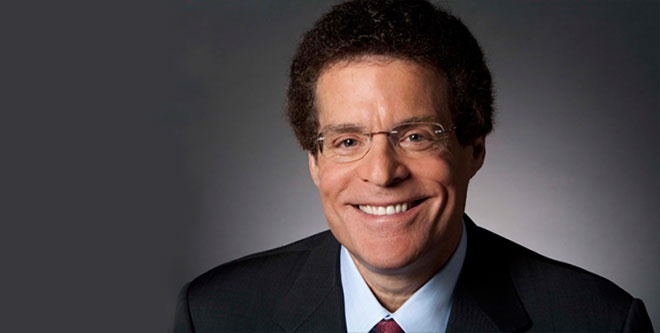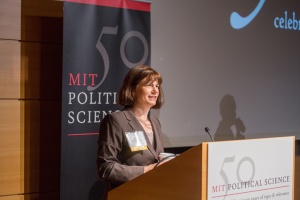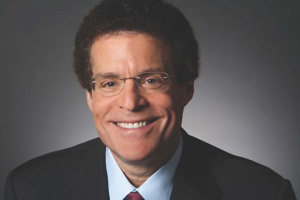ALUMNI SPOTLIGHT
Drew Altman, PhD ’83:
On Course XVII, and advancing health policy at a national level

Dr. Drew Altman, President and CEO of the Henry J. Kaiser Family Foundation
Photo courtesy of Dr. Drew Altman
In November 2015, MIT's Department of Political Science celebrated its 50th anniversary, marking a half century of rigor and relevance. In tribute to our alumni who have made the department the successful and diverse community that it is today, the department is highlighting three alumni who joined us for the celebration.
Long before his time at the helm of the Kaiser Family Foundation, Dr. Drew Altman decided to deploy his PhD in political science in the most practical way possible. He entered the world of policy, where he rapidly developed a reputation as an innovator and a public educator. In the early 1990s, Dr. Altman helped transform the Kaiser Foundation into a policy analysis organization, serving as a “non-partisan source of facts.” The policy world has responded with gratitude and praise. In 2015, the Albert Schweitzer Fellowship presented him with the Clarion Award for Health Promotion and Education. Two years earlier, the Washington Post Wonkblog voted the Kaiser Foundation the “Think Tank of the Year,” hailing the organization for producing accessible, comprehensive, and accurate information on the 2010 Affordable Care Act. Here, Dr. Altman explains his journey from political science to public service, the ongoing salience of health care in politics, and the many avenues open to MIT graduates who wish to make a difference.
Q. You’ve spent your career tackling major health policy issues, from your days as commissioner of the Department of Human Services for the state of New Jersey to your current work as CEO of the Kaiser Family Foundation. What first drew you into the field of political science, and subsequently a career in health policy? In what ways did your political science training at MIT help prepare you for your health policy work?
A. It seemed to me early on that the obstacles to addressing the big social problems I have always cared the most about were not technical. Instead they are about how our political system works, and fails to work. That brought me to political science and to a career in government, policy analysis and public service, ultimately establishing the Kaiser Family Foundation as an independent source of policy information in the health system. Even more then the specific knowledge I took from my training in the Department, the greatest gift was a tolerance for how the world of policy I would work in would actually function.
Q. What role will health policy issues play in the upcoming presidential elections?
A. Health care is obviously at the center of the larger battle right now between left and right in our country. The health policy agenda is increasingly multifaceted, with the Affordable Care Act, Medicare, Medicaid, opioid abuse, and a host of consumer issues such as drug prices and rising deductibles all in play. It tends to generate more heat than it does move votes, but it will remain prominent for the foreseeable future.
Q. The MIT approach to both research and education is to combine the STEM fields with the humanities, arts, and social sciences. Can you tell us something about why MIT’s SHASS subjects — particularly political science — are critical to solving problems with competing interests such as the US healthcare system?
A. Health care is nothing if not big money and big politics. (It was not always that way; when I started in the field it was a second tier issue). You cannot run for office, balance a budget, traverse a congressional session, run a business, deal sensibly with the U.S. economy, or — most important of all — make ends meet in a family budget, without dealing with health care. Every discipline, but especially political science, can inform the health care discussion, but to do that, academe must see informing national policy debate as part of its charge.
Q. A great number of MIT undergraduates are interested in health policy, some because they want to work in healthcare-related industries (medicine, medical devices, pharmaceuticals), some because they want to work directly in the policy world, domestically or globally. What advice do you have for those interested in shaping health policy going forward?
A. Health policy will be an ever-expanding growth field, central to the economy and to politics. But get your goals straight and be clear eyed about choices. I live and work in the land of Google and Facebook and many of the most innovative companies in the world, and some of our employees leave us to join leading Silicon Valley firms. But a company is always a company. If you go into industry you can have a great career, make money, and — in the right company — benefit the public, too. But the corporate world is about making money — it is not another form of public service and it is not, in the main, where you go to do public policy. If instead you choose public service — and if you are interested in health policy — you don’t necessarily have to go into government, or go in and stay in for your entire career. But you do have to develop specialized expertise and get involved.
Health policy work is also different from the academic enterprise in many ways. One of them is that the fundamental purpose is not to fill gaps in knowledge but to apply it to shaping debate and solving problems. There are no wrong choices and few irrevocable ones. Be clear about the ones you make and why you are making them.

